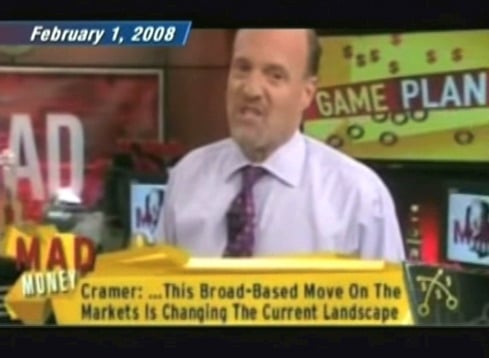This article is cross-posted from the Center for Media and Democracy’s PRWatch
Today, CNBC’s Mad Money with Jim Cramer’s “Invest in America” series will take the show to a seemingly unlikely locale, a place many would consider the middle of nowhere – North Dakota.
Why North Dakota? Four words: The Bakken Shale Formation.
Referred to as “Kuwait on the Prairie” by The New Yorker in an April 2011 feature story and located predominately in northwest North Dakota, the shale formation possesses a vast amount of both oil and methane gas, gathered via the notorious fracking process. Recognizing the economic opportunities that the formation would present to fossil fuel corporations, the U.S. Energy Information Administration penned a report in November 2006 titled “Technology-Based Oil and Natural Gas Plays: Shale Shock! Could There Be Billions in the Bakken?”, highlighting them in some depth.
The report opens on this note:
In short, the Bakken Shale, like the Marcellus Shale, Haynesville Shale, Eagle Ford Shale, Barnett Shale, Fayetteville Shale, and other shale basins, is big business for big methane gas drilling corporations.
Even more importantly in this case is the fact that CNBC is a subdivision of NBC, which is owned by General Electric (GE).
The General Electric Economic Stake in the Bakken Shale
On February 10, the Associated Press reported that GE Energy Financial Services formed a partnership with Sequel Energy LLC, whose headquarters are in Denver, Colorado.
The partnership’s purpose was to acquire oil and gas reserves located in the Williston Basin, where the Bakken Shale is located, from St. Mary Land & Exploration Co., for $137 million.
AP reported, “The companies declined to disclose the size of the reserves but said they are in producing fields. Other financial and operational details were not disclosed.”
The press release on CNBC’s preview of Cramer’s visit to the Bakken Shale reads,
Cramer, a de facto employee of GE, which has a direct economic stake in his cheerleading rather than objective reporting, will most likely cover the “mad money” that could be made by a small handful of rich corporations, including his own, from exploitation of the Bakken Shale.
In all likelihood, though, he will not cover the angle most inconvenient to the methane gas industry – the multitude of ecological perils inherent in fracking for gas and burning it.
Don’t expect to hear much about that in this edition of Cramer’s “Invest in America” series at the Bakken Shale.
Subscribe to our newsletter
Stay up to date with DeSmog news and alerts







